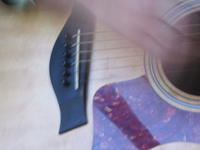are you gonna finish that ?
first: last night i saw MIA's show in detroit. the show was mediocre, just not very interesting. the crowd was depressing, as though the room was filled, paradoxically, with a collective disinclination to "keeping it real." lots of girls who spent a lot of time picking out "terrorist chic" or "british council housing" outfits at forever 21. MIA's backup singer, cherry, was the best part of the night. i did appreciate that what sounds, on her tracks, like just really precise production could be recreated live on a fairly spare set. and i can still get down to it. but on the whole, discouraging. still, i'm from maine, so any live show is a better live show than i'm used to. unless its a creedence cover band, which isn't really my scene. but you could hear one every night of the week where i come from.
but what am i complaining about ? these fans identified with MIA by buying her album and her persona. just as i have so recently defended my right to do.
second: yet, as i suspected, this is all going somewhere. in _Noise_, Jacques Attali writes:
"music is not innocent: unquantifiable and unproductive, a pure sign that is now 'for sale,' it provides a rough sketch of the society under construction, a society in which the informal is mass produced and consumed, in which difference is artificially recreated in the multiplication of semi-identical objects" (5).
so on one hand, "pop as solipsism." but as mass produced and multiplied solipsism. which i would call implosion. but Adorno wouldn't necessarily agree as easily as i made him agree in my earlier post. he both stands against the relativism implied by this kind of analysis, and by mine, while also providing the ground from which an argument like Attali's can emerge. In his introduction to _Noise_, Fredric Jameson writes:
"the Frankfurt School, and most notably Adorno himself, sought escape from this kind of relativism by appealing to a Hegelian conception of aesthetic or formal self-consciousness. The utopian principle of value for these writers lies in freedom itself and in the conception of music as 'the enemy of fate.' Yet Adorno's other principle of evaluation is that of technical mastery, in which the superiority of a Schoenberg over a Hindemith, say, or a Sibelius, lies in the former's will to draw the last objective consequences from the historical state in which he found his own raw materials. These two principles, however, are capable, at certain moments in history, of entering into contradiction with one another..." (x).
I would argue that this utopian principle is what in part allows for the future orientation of Attali's work. and if technical mastery is in fact important to Adorno, i stand corrected. but what is technical mastery today, anyway? could we define technical mastery in terms of an artist's (or genre's) ability to utilize reproduction and distribution technologies to better market and sell their musical goods? perhaps these are the "last objective consequences" and then the present moment of "pop as solipsism" is when music "as the enemy of fate" enters into contradiction with these consequences. would this not be an implosive moment if technological mastery's end goal is consumption, also the fate to which music wants to oppose itself?
the implosive logic i am espousing also finds voice in Attali's idea of 'autosurveillance', which Jameson finds in his "tough minded insistence on the ambiguity, or better still, the profound ambivalence, of the new social, economic, and organizational principles....autosurveillance marks the penetration of information technology within the body and the psyche of the individual subject.... under autosurveillance, capital and the state no longer have to do anything to you, because you have learned to do it to yourself" (xiii). in terms of music, autosurveillance could be characterized as the false consciousness of identification through consumption, which is all the while not at all false because it also signals the real identification which music makes possible. and somehow, implosive solipsism leads to music as Attali's "immaterial recording surface for human works, the mark of something missing, a shred of utopia to decipher, information in negative, a collective 'memory' allowing those who hear it to record their own personal meanings, affirmed in time with the beat -- a collective memory of order and genealogies, the repository of the word and the social score" (9).
third: and i had no idea it would come to this. autosurveillance as the implosion of capital into my living space. John Cage:
"Nevertheless, we must bring about a music which is like furniture -- a music, that is, which will be part of the noises of the environment, will take them into consideration. I think of it as melodious, softening the noises of the knives and forks, not dominating them, not imposing itself. It would fill up those heavy silences that sometimes fall between friends didning together. It would spare them the trouble of paying attention to their own banal remarks. And at the same time it would neutralize the street noises which so indiscreetly enter into the play of conversation. To make such noise would be to respond to a need" (112).
but: Bloc Party: "For richer, for poorer, for better, for worse/ We've got crosses on our eyes/ We've been walking into the furniture" ("Like Eating Glass").


